Holden: Ethical Design of Holography with Dense wireless Networks. HORIZON-EIC-2022-PATHFINDEROPEN-01-01. 2023-2026.
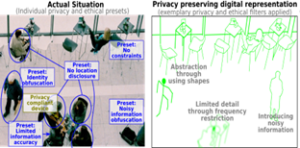 The project is funded within the HORIZON-EIC Pathfinder open program. EIC Pathfinder Open supports early-stage development of radically new technologies. HOLDEN constitutes a concentrated effort to explore social aspects of RF-sensing to guide the technological advance and to derive technology for ethically and privacy compliant perception. See the Link.
The project is funded within the HORIZON-EIC Pathfinder open program. EIC Pathfinder Open supports early-stage development of radically new technologies. HOLDEN constitutes a concentrated effort to explore social aspects of RF-sensing to guide the technological advance and to derive technology for ethically and privacy compliant perception. See the Link.
TRUSTroke: Trustworthy AI for Stroke Pathways improvement. HORIZON-HLTH-2022-STAYHLTH-01-two-stage. 2023-2027.
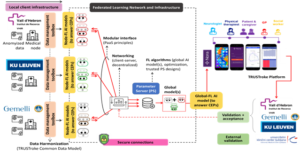 The project proposes a novel trustworthy by design and privacy-preserving AI-based platform to assist clinicians, patients and caregivers in the management of acute and chronic phases of ischemic stroke, based on the integration of clinical and patient-reported data for a trustworthy assessment of disease progression. A Federated Learning (FL) infrastructure (hosted by CERN) will be developed and used to enable multiple entities to collaboratively build several trustworthy AI based predictive models by leveraging stroke data without compromising privacy and implementing best-in-class security protocols, easing compliance with GDPR and lowering adoption barriers by hospitals. See the Link.
The project proposes a novel trustworthy by design and privacy-preserving AI-based platform to assist clinicians, patients and caregivers in the management of acute and chronic phases of ischemic stroke, based on the integration of clinical and patient-reported data for a trustworthy assessment of disease progression. A Federated Learning (FL) infrastructure (hosted by CERN) will be developed and used to enable multiple entities to collaboratively build several trustworthy AI based predictive models by leveraging stroke data without compromising privacy and implementing best-in-class security protocols, easing compliance with GDPR and lowering adoption barriers by hospitals. See the Link.
RadioSense: Big Data for the next-gen Smart Industry (BDSI). Funding ERA-NET COFUND (H2020) – CHIST-ERA III. 2019-2022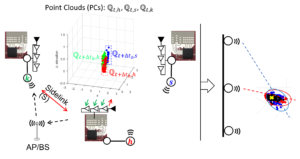
Summary. Building on all partner’s long expertise in device-free radio-based sensing, the RadioSense project kick starts the development of innovative sensing tools as key enablers in advanced manufacturing and human-robot collaborative workspaces. RadioSense technology leverages real-time collection and processing of heterogeneous radio signal streams (e.g., those found in 4G/5G and WiFi connections) and PHY/MAC Channel State Information (CSI) that form a specific type of “big data”. The RadioSense project is funded by the 2017 call under the topic Big Data and process modelling for Smart Industry (BDSI). See the website RadioSense and also the Link.
CyberSort: Sistema robotizzato per la separazione dei rifiuti e il recupero delle materie prime seconde. Funding: Accordo Quadro Regione Lombardia – CNR 2016-2019.
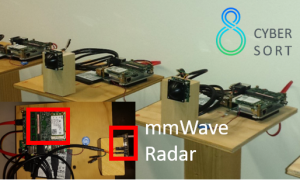
Project summary. The aim of the Cyber-Sort project is to design and develop innovative models and technologies for the identification, sorting and separation of valuable materials from End-of-Life (EoL) waste stream with the aim to reuse secondary raw materials. Innovative sensing and automated robotic sorting technologies will be developed for the recognition of different materials. The Cyber-Sort project will promote the shift towards a circular economy approach, developing innovativemethods and technologies for demanufacturing and optimum strategies for EoL. IEIIT and WaveLab are involved in the design, development and validation of a prototype of a wireless IoT platform for safe human-robot interactions in shared workspaces that uses advanced radio-frequency sensors working in the GHz up to THz bands.
MIE: Mobilità Intelligente Ecosostenibile 2014-2018. Funding: MIUR Cluster Tecnologico Nazionale “Technologies for the Smart Communities”
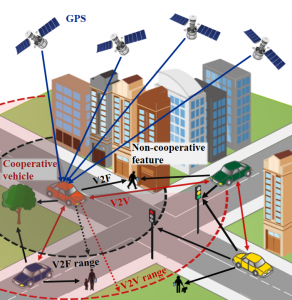 Project Summary. The MIE project aims to develop hardware/software methodologies, indicators and policies for mobility management to minimize the environmental impact, improve the service quality in terms of travelling times, and optimize consumption to accomplish movements. The research focuses on the design of a mobility management system based on innovative technologies for traffic monitoring and control (wireless sensors with low power consumption, smartphone applications, intelligent traffic lights, entry barriers, computerized access, etc.), analytical models combining historical data with real time traffic information and innovative decision support systems to sustain intelligent mobility policies. POLIMI and WaveLab contribute to the MIE project with the design of cooperative localization technologies for accurate tracking of mobile users (pedestrians, vehicles or assets) including active and passive radio sensing systems, ii) IoT networks based on wireless sensors for traffic monitoring and control, iii) probabilistic machine learning methods for predictive traffic data analytics.
Project Summary. The MIE project aims to develop hardware/software methodologies, indicators and policies for mobility management to minimize the environmental impact, improve the service quality in terms of travelling times, and optimize consumption to accomplish movements. The research focuses on the design of a mobility management system based on innovative technologies for traffic monitoring and control (wireless sensors with low power consumption, smartphone applications, intelligent traffic lights, entry barriers, computerized access, etc.), analytical models combining historical data with real time traffic information and innovative decision support systems to sustain intelligent mobility policies. POLIMI and WaveLab contribute to the MIE project with the design of cooperative localization technologies for accurate tracking of mobile users (pedestrians, vehicles or assets) including active and passive radio sensing systems, ii) IoT networks based on wireless sensors for traffic monitoring and control, iii) probabilistic machine learning methods for predictive traffic data analytics.
Wireless Smart Refinery: Industrial Wireless Network deployment optimization in Oil and Gas Refineries. Funding and Partners: Saipem, eni, EP PetroEcuador, ESPOL University (Ecuador).
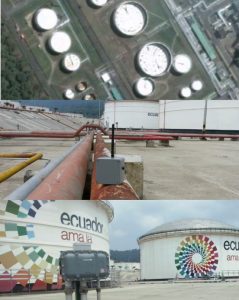 Project summary. Industry 4.0 and industrial Internet of Things (iIoT) trends are pushing towards the transformation of factories to provide more flexible production systems through the use of wireless networks. Technologies enabling the “Factory-of-Things” (FoT) paradigm allow the safe deployment of wireless field devices in industrial plants thanks to their low-battery usage that makes the maintenance cycle quite low, and highly reliable. In factory sites, the strength of the radio signals is impaired by frequency, spatial and time-domain fading that influence the wireless link stability. In this project, based on an extensive measurement campaign performed inside an active oil refinery, we performed an initial feasibility study on the adoption of wireless technology in a oil&gas refinery, and in turn develop efficient tools to help the network deployment activities in strategic sites and applications. Such tools should perform the prediction of radio signal coverage, and provide hints for the designer to properly position the wireless field devices. The goal of the project is thus to provide the fundamental know-how on the specific settings that can generalize an industry-standard method for industrial wireless network optimization in industrial plants.
Project summary. Industry 4.0 and industrial Internet of Things (iIoT) trends are pushing towards the transformation of factories to provide more flexible production systems through the use of wireless networks. Technologies enabling the “Factory-of-Things” (FoT) paradigm allow the safe deployment of wireless field devices in industrial plants thanks to their low-battery usage that makes the maintenance cycle quite low, and highly reliable. In factory sites, the strength of the radio signals is impaired by frequency, spatial and time-domain fading that influence the wireless link stability. In this project, based on an extensive measurement campaign performed inside an active oil refinery, we performed an initial feasibility study on the adoption of wireless technology in a oil&gas refinery, and in turn develop efficient tools to help the network deployment activities in strategic sites and applications. Such tools should perform the prediction of radio signal coverage, and provide hints for the designer to properly position the wireless field devices. The goal of the project is thus to provide the fundamental know-how on the specific settings that can generalize an industry-standard method for industrial wireless network optimization in industrial plants.
Envisense Funding Agency: Regione Lombardia, Bando InnoDriver S3 – Edizione 2017 – Misura A, POR FESR 2014-2020.
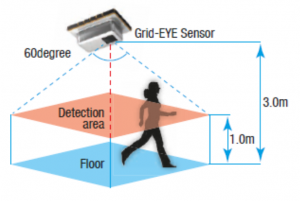 Project summary. The aim of the EnviSense project is to analyze, design and develop innovative devices and advanced HW/SW platforms for indoor monitoring in smart living scenarios. In particular, the goal of the project is to develop a system based on thermal array sensors for human body tracking and counting. Probabilistic methods based on machine learning are proposed to track and classify heat signatures corresponding to body movements or presence. Applications are in smart home and indoor automation fields.
Project summary. The aim of the EnviSense project is to analyze, design and develop innovative devices and advanced HW/SW platforms for indoor monitoring in smart living scenarios. In particular, the goal of the project is to develop a system based on thermal array sensors for human body tracking and counting. Probabilistic methods based on machine learning are proposed to track and classify heat signatures corresponding to body movements or presence. Applications are in smart home and indoor automation fields.
